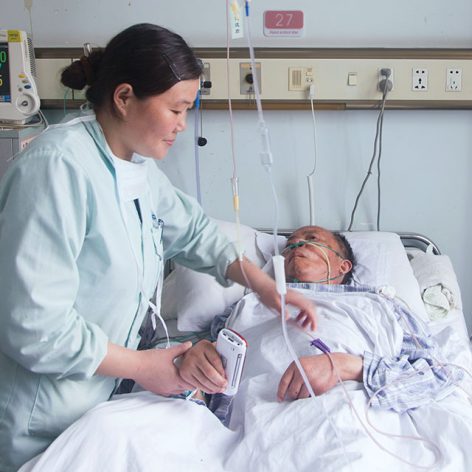The most recent 2017 nutritional recommendations from the European Society of Parenteral and Enteral Nutrition (ESPEN) for surgical patients1Weimann et al. Espen guideline, Clinical nutrition in surgery. Clinical Nutrition. Published on 2017 indicates that early oral feeding is the preferred mode of nutrition for surgical patients. The focus of this guideline is to cover nutritional aspects of the Enhanced Recovery after Surgery (ERAS) evidence-based surgical treatment protocol. Danone Research & Innovation has played an important role in the development of the ERAS programme and still supports its worldwide rollout.
In the 1990s, Danone Research & Innovation recognised that surgical patients were at risk of malnutrition and that this was associated with poor clinical outcomes after surgery. We started pioneering by studying the effect of oral nutritional supplementation before or after surgery and before and after surgery on clinical outcomes. These published studies with Nutricia’s oral nutritional supplements showed improved recovery of surgical patients by means of fewer complications, reduced hospital stay and increased muscle strength.2Keele et al, Two phase randomised controlled clinical trial of postoperative oral dietary supplements in surgical patients. Gut. Published on 1997;40:393-399 ,3Rana et al, Short term benefits of post-operative oral dietary supplements in surgical patients. Clin Nutr. Published on 1992 Dec;11(6):337-44 ,4Smedley F1, Bowling T, James M, Stokes E, Goodger C, O’Connor O, Oldale C, Jones P, Silk D, Randomized clinical trial of the effects of preoperative and postoperative oral nutritional supplements … Continue reading
Later, insights into the metabolic stress of surgical patients taught us that fasting before surgery causes additional metabolic stress in surgery, resulting in increased post-operative insulin resistance, associated with worse clinical outcomes.5Nygren, J. et al. Site of insulin resistance after surgery: the contribution of hypocaloric nutrition and bed rest. Clin Sci (Lond). Published on 1997 Aug;93(2):137-46 ,6Thorell et al, Insulin resistance: a marker of surgical stress. Curr Opin Clin Nutr Metab Care. Published on 1999 Jan;2(1):69-78 Therefore, although fasting before surgery was routine practice in order to have an empty stomach at time of anaesthesia (to prevent risk of vomiting, aspiration and pneumonia), this appeared to not be the optimal way to prepare for surgery.7Nygren, J. et al. Preoperative gastric emptying. Effects of anxiety and oral carbohydrate administration. Ann Surg. Published on 1995 Dec;222(6):728-34 ,8Ljungqvist et al. Insulin resistance and elective surgery. Surgery. Published on 2000 Nov;128(5):757-60
Together with experts in this field, Danone Research & Innovation developed a breakthrough innovative nutritional solution allowing surgical patients to drink up to two hours before surgery instead of fasting. The product was designed in such a way that it results in an anabolic metabolic response as a result of fasting and will be emptied from the stomach in order to have an empty stomach at the time of anaesthesia. This is contrasting a catabolic response. A metabolic process can be categorized as anabolic or catabolic. With anabolism molecules are built from smaller units. With catabolism macromolecules are detached. Safety and efficacy of this carbohydrate-containing product has been tested by many different experiments and randomised clinical trials, starting with animal studies9Nettelbladt, C.G. Pre-stress carbohydrate solution prevents fatal outcome after haemorrhage in 24 hour food deprived rats. Nutrition. Published on 1996 Oct;12(10):696-9 , healthy volunteer studies10Nygren et al. Preoperative gastric emptying. Effects of anxiety and oral carbohydrate administration. Ann Surg. Published on 1995 Dec;222(6):728-34 and studies in surgical patients.11Nygren, J. et al. Preoperative oral carbohydrate administration reduces postoperative insulin resistance. Clin Nutr. Published on 1998 Apr;17(2):65-71 ,12Soop, M, et al. Preoperative oral carbohydrate treatment attenuates immediate postoperative insulin resistance. Am J Physiol Endocrinol Metab. Published on 2001 Apr;280(4):E576-83. These studies show that pre-operative carbohydrate loading can reduce the post-operative metabolic stress (less insulin resistance)13Nygren, J. et al. Preoperative oral carbohydrate administration reduces postoperative insulin resistance. Clin Nutr. Published on 1998 Apr;17(2):65-71 ,14Soop, M, et al. Preoperative oral carbohydrate treatment attenuates immediate postoperative insulin resistance. Am J Physiol Endocrinol Metab. Published on 2001 Apr;280(4):E576-83 and improve pre-operative well-being with less post-operative nausea and vomiting15Hausel, J. et al. Preoperative carbohydrates reduce postoperative nausea and vomiting after elective laparoscopic cholecystectomy Clin Nutr August 2003, Vol. 22, S76. Published on (ESPEN 2003) and reduced hospital stay.16Hofman Z, van Drunen J, Yuill K, Richardson R, Davidson I, Cecil, T, Moran B, Garden OJ. Provision of a pre-operative oral carbohydrate drink reduces length of hospital stay in uncomplicated elective … Continue reading,17Ljungqvist O1, Nygren J, Thorell A. Modulation of post-operative insulin resistance by pre-operative carbohydrate loading. Proc Nutr Soc. Published on 2002 Aug;61(3):329-36
The benefits of oral nutritional supplementation and pre-operative carbohydrate loading have led to recommendations in 2006 by ESPEN18Weimann, A. et al. ESPEN Guidelines on Enteral Nutrition: Surgery including organ transplantation. Clinical Nutrition Volume 25, Issue 2, Published on April 2006, Pages 224-244 to use oral nutritional supplements and pre-operative carbohydrate loading for surgical patients.
Around the same time, a group of European surgeons used evidence-based practice to treat surgical patients and developed the ERAS protocol (following the Fast Track protocol developed by Kehlet19Kehlet H. Multimodal approach to control postoperative pathophysiology and rehabilitation. Br J Anaesth. Published on 1997;78:606–617 , a concept of enhanced recovery after surgery), which also included peri-operative nutritional support20Fearon, K.C. Enhanced recovery after surgery: a consensus review of clinical care for patients undergoing colonic resection. Clinical Nutrition. Published on 2005 Jun;24(3):466-77 . The efficacy of this ERAS protocol, including the use of Nutricia’s oral nutritional supplements and pre-operative carbohydrate loading, has been studied in many different European hospitals by comparing with traditional care. Meta-analysis of the results show a reduction in rate of complications and hospital length of stay.21Varadhan, K.K, et al. The enhanced recovery after surgery (ERAS) pathway for patients undergoing major elective open colorectal surgery: A meta-analysis of randomized controlled trials Clinical … Continue reading
The ERAS Society has published various recommendations also including one for bariatric surgery.22Thorell, A. et al. Guidelines for Perioperative Care in Bariatric Surgery: Enhanced Recovery After Surgery (ERAS) Society Recommendations. World Journal of Surgery. Published on 2016 Sep;40(9):2065-83 Danone Research & Innovation is still supporting the ERAS Society via an unrestricted educational grant in order to further roll out evidence-based treatment as best care practice in order to improve the recovery of surgical patients.
“Nutrition should be integrated into the overall management of the patient”
ESPEN guideline: Clinical nutrition in surgery23Thorell et al, Insulin resistance: a marker of surgical stress. Curr Opin Clin Nutr Metab Care. Published on 1999 Jan;2(1):69-78
View References
| 1 | Weimann et al. Espen guideline, Clinical nutrition in surgery. Clinical Nutrition. Published on 2017 |
|---|---|
| 2 | Keele et al, Two phase randomised controlled clinical trial of postoperative oral dietary supplements in surgical patients. Gut. Published on 1997;40:393-399 |
| 3 | Rana et al, Short term benefits of post-operative oral dietary supplements in surgical patients. Clin Nutr. Published on 1992 Dec;11(6):337-44 |
| 4 | Smedley F1, Bowling T, James M, Stokes E, Goodger C, O’Connor O, Oldale C, Jones P, Silk D, Randomized clinical trial of the effects of preoperative and postoperative oral nutritional supplements on clinical course and cost of care. Br Surg. Published on 2004 Aug;91(8):983-90 |
| 5 | Nygren, J. et al. Site of insulin resistance after surgery: the contribution of hypocaloric nutrition and bed rest. Clin Sci (Lond). Published on 1997 Aug;93(2):137-46 |
| 6, 23 | Thorell et al, Insulin resistance: a marker of surgical stress. Curr Opin Clin Nutr Metab Care. Published on 1999 Jan;2(1):69-78 |
| 7 | Nygren, J. et al. Preoperative gastric emptying. Effects of anxiety and oral carbohydrate administration. Ann Surg. Published on 1995 Dec;222(6):728-34 |
| 8 | Ljungqvist et al. Insulin resistance and elective surgery. Surgery. Published on 2000 Nov;128(5):757-60 |
| 9 | Nettelbladt, C.G. Pre-stress carbohydrate solution prevents fatal outcome after haemorrhage in 24 hour food deprived rats. Nutrition. Published on 1996 Oct;12(10):696-9 |
| 10 | Nygren et al. Preoperative gastric emptying. Effects of anxiety and oral carbohydrate administration. Ann Surg. Published on 1995 Dec;222(6):728-34 |
| 11, 13 | Nygren, J. et al. Preoperative oral carbohydrate administration reduces postoperative insulin resistance. Clin Nutr. Published on 1998 Apr;17(2):65-71 |
| 12 | Soop, M, et al. Preoperative oral carbohydrate treatment attenuates immediate postoperative insulin resistance. Am J Physiol Endocrinol Metab. Published on 2001 Apr;280(4):E576-83. |
| 14 | Soop, M, et al. Preoperative oral carbohydrate treatment attenuates immediate postoperative insulin resistance. Am J Physiol Endocrinol Metab. Published on 2001 Apr;280(4):E576-83 |
| 15 | Hausel, J. et al. Preoperative carbohydrates reduce postoperative nausea and vomiting after elective laparoscopic cholecystectomy Clin Nutr August 2003, Vol. 22, S76. Published on (ESPEN 2003) |
| 16 | Hofman Z, van Drunen J, Yuill K, Richardson R, Davidson I, Cecil, T, Moran B, Garden OJ. Provision of a pre-operative oral carbohydrate drink reduces length of hospital stay in uncomplicated elective surgical patients. European Journal of Anaesthesiology. Published on 2003; 20. S30 |
| 17 | Ljungqvist O1, Nygren J, Thorell A. Modulation of post-operative insulin resistance by pre-operative carbohydrate loading. Proc Nutr Soc. Published on 2002 Aug;61(3):329-36 |
| 18 | Weimann, A. et al. ESPEN Guidelines on Enteral Nutrition: Surgery including organ transplantation. Clinical Nutrition Volume 25, Issue 2, Published on April 2006, Pages 224-244 |
| 19 | Kehlet H. Multimodal approach to control postoperative pathophysiology and rehabilitation. Br J Anaesth. Published on 1997;78:606–617 |
| 20 | Fearon, K.C. Enhanced recovery after surgery: a consensus review of clinical care for patients undergoing colonic resection. Clinical Nutrition. Published on 2005 Jun;24(3):466-77 |
| 21 | Varadhan, K.K, et al. The enhanced recovery after surgery (ERAS) pathway for patients undergoing major elective open colorectal surgery: A meta-analysis of randomized controlled trials Clinical Nutrition. Published on 2010 Volume 29, Issue 4, Pages 434–440 |
| 22 | Thorell, A. et al. Guidelines for Perioperative Care in Bariatric Surgery: Enhanced Recovery After Surgery (ERAS) Society Recommendations. World Journal of Surgery. Published on 2016 Sep;40(9):2065-83 |


